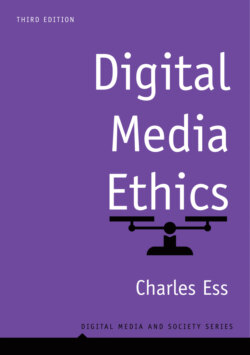Читать книгу Digital Media Ethics - Charles Ess - Страница 15
(Ethical) life in the (post-)digital age?
ОглавлениеIn keeping with their increasingly central importance in our lives, “digital media” are the subject of an ever-growing range of analyses in a number of disciplines (e.g., Couldry 2012; Davisson and Booth 2016). At the same time, there has been something of a popular turn in our experiences with and sensibilities toward digital media in recent years. Broadly, a largely optimistic assumption that new technologies would make our lives better in many ways – whether as consumers satisfied with the latest convenience of, say, a voice-activated digital assistant or smart home, and/or as citizens in a world of increasing individual and collective freedom, democracy, and prosperity – is increasingly overshadowed by darker developments, such as the Cambridge Analytica scandal (Solon 2017). At the same time, more and more of us are becoming aware of how “our minds can be hijacked” (Lewis 2017) – in part, as more and more “tech dissenters,” including Justin Rosenstein, the coder who invented Facebook’s “like” button, have become increasingly and publicly critical of the very technologies they themselves have built.
Lastly, since as early as 2000 (Cascone), an increasing number of scholars and researchers argue that we are now living in a post-digital era (e.g., Berry 2014; Lindgren 2017; Ess 2019). Some obvious markers of this era are the increasing popularity of primarily analogue technologies, including analogue film, vinyl records, and rising interest in board games (Birkner 2017); we will explore additional examples, such as “slow technology” and “digital detox” (chapter 4). To be clear: “post-digital” does not mean “anti-digital.” It signals, rather, a broader shift from an exclusive focus on “the digital” – to the exclusion of “the analogue” – to a more nuanced balance and recognition of the roles and importance of each in our lives.
At the same time, digital media represent strong continuities with earlier forms of analogue communication and information media: the latter include printed books, journals, and newspapers, what we now call “hardcopy” letters, and, for example, traditional forms of mass media such as newspapers and “one-to-many” broadcast media such as radio and TV. We will note and explore these continuities more fully in our efforts to evaluate one of the larger ethical questions we will confront – namely, do digital media present us with radically new kinds of ethical problems that thereby require absolutely new ethical approaches? Such questions are often driven by emphasizing instead important differences between earlier media and digital media. Such an emphasis, however, also drives the either/or approach underlying much popular media reporting. In any event, these differences often are part of why new ethical issues come up in conjunction with digital media. Exploring these differences at the outset is hence a good starting point.
Three especially relevant characteristics of digital media are: how digital media foster convergence; digital information as “greased”; and digital media as ubiquitous and global communication media.
